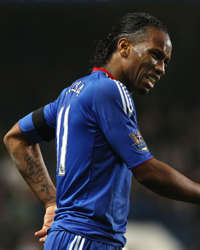The date was Sept 1, 2008 and, for the first time under the billionaire ownership of Roman Abramovich, Chelsea had lost out on a player to rivals with deeper pockets.
Robinho duly joined Manchester City for a British transfer record fee of £32.5 million and the Premier League landscape has not been the same since.
In a stroke, Chelsea’s reputation as the school playground’s ultimate bully was dismantled. And, although there have been three further trophies, the sense that this is an ageing Chelsea team with an excessive reliance on the core of John Terry, Frank Lampard and Didier Drogba has only heightened.
It had been hoped that the inevitable transition could be managed rather than bought. The rationale was that the initial spending splurge had been necessary but, with millions also invested in the academy, Chelsea would produce a conveyor belt of young talent.
One key consideration was missing: clubs with the best history of producing players — Manchester United, Arsenal and Crewe Alexandra — tend also to have had stability in the dugout.
For Chelsea, with Abramovich also expecting instant success, no manager can have felt sufficient job security to risk the sort of faith in young talent as Arsène Wenger has at Arsenal.
So if Chelsea are unable to organically grow their way out of the current slump, can we expect a return to the sort of spending to rival Manchester City?
The evidence is mounting that Abramovich is no longer prepared to sign the sort of cheques that he once seemed to distribute like confetti.
Andrei Shevchenko, Didier Drogba, Shaun Wright-Phillips, Ricardo Carvalho and Michael Essien all cost in excess of £19 million, but the last of the club’s five most expensive transfer fees was paid in 2006.
Abramovich is certainly a less obvious presence at Chelsea matches than during the first few years and there is a long-standing suspicion that his interest may have waned.
It is also difficult to ignore Russia’s 2018 World Cup bid. Abramovich has already ploughed millions into improving football facilities in his homeland and has been closely involved with the successful 2018 campaign.
The expectation of significant financial support is no secret. “Let him dip into his pocket a bit,” said Vladimir Putin, the Russia president. “It’s no big deal; he won’t feel the pinch. He has plenty of money.”
Abramovich’s spokesman has responded by stressing that his backing for Chelsea would “absolutely” continue.
There are other pressures. It is no secret that Abramovich was affected by the global credit crunch. Estimates of his wealth vary but, from 11th on the Forbes rich list in 2006 with a worth of £11.4 billion, he had fallen to 50th last year at £7 billion.
Uefa’s new rules on ‘financial fair-play’ are also significant. It was interesting that Abramovich was among those to give his personal support to Michel Platini’s principle that, from the accounting year 2011-12, clubs should not run at a loss.
Yet without another major spending spree, it is difficult to see how Chelsea will keep pace with Manchester City or even the more stable environments for nurturing players of Arsenal and United.


